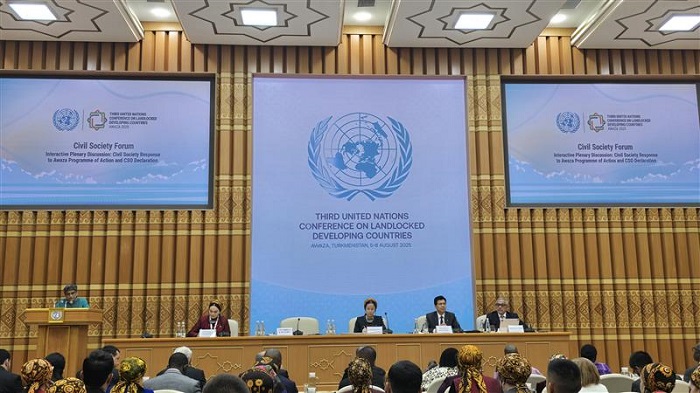Our Terms & Conditions | Our Privacy Policy
Civil Society Forum in Awaza: A Pivotal Step Toward Sustainable Development for Landlocked Nations
Ravilya Kadyrova and Elvira Kadyrova, Awaza, Turkmenistan
On 4-5 August 2025, the National Tourist Zone of Awaza hosted the first-ever Civil Society Forum as part of the Third United Nations Conference on Landlocked Developing Countries (LLDC3). Held under the theme “Driving Progress through Partnerships,” the forum provided a dynamic platform for civil society representatives, academia, private sector stakeholders, and government officials to shape the sustainable development agenda for the 32 landlocked developing countries (LLDCs) through the Awaza Programme of Action (APoA).
The forum opened with high-level remarks emphasizing the critical role of civil society in addressing the structural challenges faced by LLDCs. These nations, home to over 570 million people, grapple with high trade costs, limited market access, and vulnerability to climate shocks, challenges exacerbated by the COVID-19 pandemic, which reversed progress under the Vienna Programme of Action and Agenda 2030.

The forum started on 4 August with an opening session moderated by Dr. Arjun K Karki, Global Coordinator of LDC Watch. Speakers included Ms. Rabab Fatima, UN Under-Secretary-General and High Representative for LLDCs, Ms. Bayramgul Orazdurdyyeva, Deputy Chairman of the Cabinet of Ministers of Turkmenistan, H.E. Lok Bahadur Thapa, Permanent Representative of Nepal to the UN and President of ECOSOC, and Ms. Oguljennet Berdiliyeva, Chairperson of the National Center of Trade Unions of Turkmenistan.
They underscored civil society’s indispensable role in fostering structural transformation, climate resilience, and inclusive innovation to advance the APoA.

The forum’s objectives were clear: to identify critical priorities, forge partnerships, showcase successful strategies, and facilitate the exchange of innovative solutions tailored to LLDCs’ unique challenges. Civil society was positioned as a key partner in ensuring policies reflect grassroots realities and drive sustainable development.
The forum featured interactive plenary sessions addressing critical areas of the APoA. The first plenary, “People-Centered Structural Transformation and Environmental Sustainability,” explored how LLDCs can achieve inclusive growth and environmental stewardship. Moderated by Mr. Chhimi Dorji (Bhutan) and Mike Banda (Malawi), the session highlighted community-based solutions for dryland management and climate resilience, with contributions from speakers like Jane Nalunga (SEATINI Uganda), Gershom Kabaso (Zambia Social Forum), and Hononire Isingizwe (Young Volunteers for the Environment, Rwanda).


On 5 August, the second plenary, moderated by H.E. Edil Baisalov of Kyrgyzstan, will focus on the “Digital Economy, Innovation, and Sustainable Development.” Speakers, including Kenan Aslanli (ITEM) and Deodat Maharaj (UN Technology Bank), will discuss bridging the digital divide and fostering innovation ecosystems to enhance productivity in LLDCs.
The third plenary, “Financial Architecture, Policies, and Partnerships for LLDCs,” moderated by Yagmyr Nurryev of Turkmenistan, will address debt sustainability and fairer financial systems.
The forum will conclude on 5 August with a high-level closing session moderated by Riz Khan, chief journalist of Al Arabiya. Speakers will include Ms. Rabab Fatima, H.E. KP Sharma Oli (Prime Minister of Nepal), and Ms. Bayramgul Orazdurdyyeva.
The LLDC3 Civil Society Forum will produce a declaration developed by the participating civil society organizations. This declaration will be shared with the Plenary of the Conference and included in its report. ///nCa, 4 August 2025
Images are for reference only.Images and contents gathered automatic from google or 3rd party sources.All rights on the images and contents are with their legal original owners.



Comments are closed.